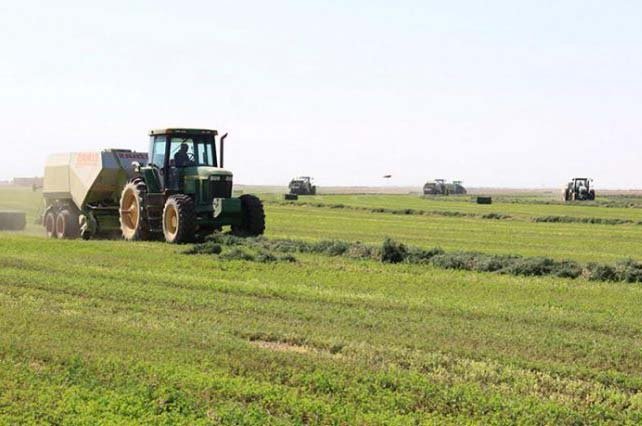A Year of War in Sudan: How Did the Agricultural Sector Manage to Survive?

15 April marks one year since the first shot was fired, igniting the war following the rebellion of the Rapid Support Forces (RSF) against the Sudanese army in the capital, Khartoum ,
However, the bullets fired this year have hit the economic sectors hard, causing significant losses that will take a long time to recover. One of the most affected sectors is the agricultural sector, which employs approximately 80% of the workforce in Sudan and contributes 32.7% to the total GDP.
Until last December, much reliance was placed on the agricultural sector to secure basic needs and to help the country recover from the devastating losses of the war. However, after the attack on Al-Gezira State, which hosts the largest agricultural projects, it has become one of the most affected sectors by the ongoing war in Sudan.
Unofficial estimates indicate that the war has destroyed 65% of the agricultural sector in Sudan, despite statistics published in the media indicating that approximately 14 million feddans were planted with corn and sorghum, and 300,000 feddans were planted with wheat in various parts of Sudan.
Former Al-Gezira Project Director Omar Marzouq said, ‘The Al-Gezira Project stood firm when the war began in Khartoum, and we managed to cultivate a large area in the summer season, estimated at 650,000 feddans, with various crops. We focused with farmers on planting mostly grains, fearing a shortage in grains.’
Marzouq added, ‘Indeed, we cultivated a large area of corn, and the harvest coincided with the winter season and wheat planting. We tried with the World Food Program, which provided us with seeds, and we managed to plant 220,000 feddans of wheat and irrigated them.
During the fertiliser period, the militia entered the Al-Gezira Project, expelled the inspectors, and seized their cars, looting the offices and the Barakat warehouses.’
He explained that no one could enter the project now after the militia took control and expelled the inspectors. He emphasised the problems with inputs such as jute and fertiliser.
Marzouq stressed that the war had a significant impact on agriculture, and the areas shrank in the summer and winter seasons. ‘We used to plant more than 1.6 million feddans in the agricultural cycle, but after the war, we only planted 700,000 feddans, and during the summer crop, the militia attacked and took the farmers’ production.’
He added, ‘There is no plan to plant new crops in the Al-Gezira Project due to the rebel militia’s control over most of the project’s areas.
The project’s management was transferred to Port Sudan, and they were unable to collect the dues granted to the farmers in Al-Managil.’
Journalist Rahab Vireni, who specializes in agricultural affairs, confirmed that the war’s effects have affected all agricultural areas, especially the Al-Gezira Project. She said, ‘The Al-Gezira Project has been subjected to theft and destruction in most of its infrastructure after the Rapid Support Forces militia took control of Al-Gezira State.’
Vireni revealed to the investigator that the militia looted the warehouses, destroyed the offices, and stole agricultural machinery, making it challenging to continue agricultural operations. Additionally, the war caused significant losses in the Al-Gezira Project. It led to the absence of agricultural inputs, especially during the last winter season and possibly extended to the next summer season.
She pointed out that the war also affected the export of summer crops such as sesame, cotton, and other oilseeds due to the scarcity and sharp increase in fuel prices because of the closure of national roads after the events in Al-Gezira State, which is a junction for several states.
For his part, a farmer in the Al-Gezira Project, Al-Zain Al-Na’ma, said that the security situation has negatively affected the economic situation, indicating that the Sudanese economy is a traditional economy based on both plant and animal agriculture.
He said, ‘The agricultural sector is relied upon to save the Sudanese economy, but it can only do so where there is stability, and stability only comes with security.’ He indicated that the agricultural production areas have been affected by the war, revealing a decrease in cultivated areas in Al-Gezira, and even those that were planted in the winter season were left by their owners at harvest time.
Al-Na’ma explained to the investigator that the war has blocked roads, raised fuel prices, made transportation difficult, and made it hard to obtain inputs and raised their prices, revealing that livestock production has been damaged and neglected due to the displacement of its owners and leaving it without care.
He added, ‘The states of western Sudan depend on livestock for their livelihood by selling and exporting it. The war has closed their external and internal markets, and their herders have left them because of the war.’
Shortlink: https://sudanhorizon.com/?p=64

